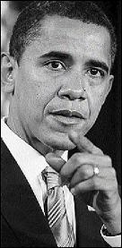Obama caps executive pay
Published: Thursday | February 5, 2009

Obama - AP
United States (US) President Barack Obama on Wednesday imposed US$500,000 caps on senior-executive pay for the most distressed financial institutions receiving federal bailout money, saying Americans are upset with "executives being rewarded for failure."
Obama announced the dramatic new government intervention in corporate America at the White House, with Treasury Secretary Timothy Geithner at his side.
The president said the executive-pay limits are a first step, to be followed by the unveiling next week of a sweeping new framework for spending what remains of the US$700 billion financial industry bailout that Congress created last year.
The executive-pay move comes amid a national outcry over huge bonuses to executives heading companies seeking taxpayer dollars to remain afloat. The demand for limits was reinforced by revelations that Wall Street firms paid more than US$18 billion in bonuses in 2008 even amid the economic downturn and the massive infusion of taxpayer dollars.
Negotiate agreements
"This is America. We don't disparage wealth. We don't begrudge anybody for achieving success," Obama said. "But what gets people upset - and rightfully so - are executives being rewarded for failure. Especially when those rewards are subsidised by US taxpayers."
The pay cap would apply to institutions that negotiate agreements with the Treasury Department for "exceptional assistance" in the future. The restriction would not apply to such firms as American International Group Inc, Bank of America Corp, and Citigroup Inc, that already have received such help.
"There is a deep sense across the country that those who were not ... responsible for this crisis are bearing a greater burden than those who were," Geithner said.
Firms that want to pay executives above the US$500,000 threshold would have to use stock that could not be sold or liquidated until they paid back the government funds.
Generally, healthy institutions would have more leeway. They also face the US$500,000 limit if they're getting government help, but the cap can be waived with full public disclosure and a non-binding shareholder vote.
Obama said that massive severance packages for executives who leave failing firms are also going to be eliminated.
"We're taking the air out of golden parachutes," he said.
Other new requirements on "exceptional assistance" will include:
The expansion to 20, from five, the number of executives who would face reduced bonuses and incentives if they are found to have knowingly provided inaccurate information related to company financial statements or performance measurements.
An increase in the ban on golden parachutes from a firm's top five senior executives to its top 10. The next 25 would be prohibited from golden parachutes that exceed one year's compensation.
A requirement that boards of directors adopt policies on spending, such as corporate jets, renovations and entertainment.
The administration also will propose long-term compensation restrictions even for companies that don't receive government assistance, Obama said.
Those proposals include:
Requiring top executives at financial institutions to hold stock for several years before they can cash out.
Requiring non-binding "say on pay" resolutions - that is, giving shareholders more say on executive compensation.
A Treasury-sponsored confe-rence on a long-term overhaul of executive compensation.
Top officials at companies that have received money from the government's Troubled Asset Relief Program already face some compensation limits.












